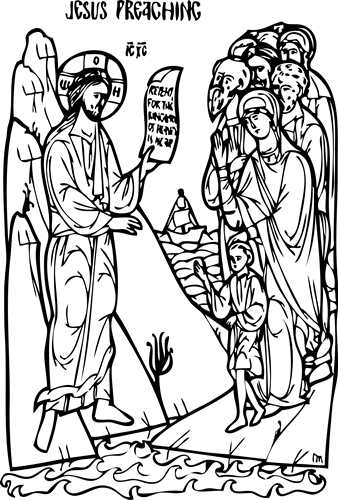|
|||
|---|---|---|---|
| This weekly bulletin insert complements the curriculum published by the Department of Christian Education of the Orthodox Church in America. This and many other Christian Education resources are available at http://dce.oca.org. | |||

In Luke 20: 1-8 we read a series of warnings that Our Lord gave to His disciples and the Jewish leaders who were questioning Him. Another warning, a very direct one about Jesus' own destiny, comes in Luke 18: 32-4. He tells His followers that the Son of Man will be "mocked and shamefully treated and spit upon; they will scourge Him and kill Him and on the third day He will rise." The disciples do not comprehend what He is telling them. We read that they "understood none of these things" and "did not grasp what was said." In the Parable of the Vineyard (Luke 20: 9-17) the warnings are again about what will happen to Jesus, but they are also about those who refuse to honor Him. He tells a parable about the owner of a vineyard who has been far away for a long time. But they beat the servant he sends to get some of the vineyard's fruits. They do the same to a second and then a third servant. The vineyard owner, we might think, would be angry enough by this time to send troops or some hired thugs to take what is his. But he doesn't do that. He asks himself, "What shall I do?" He then gives the tenants another chance, and sends his own son. Of course we know that the owner in the parable is God the Father, and the Son is Jesus Christ. The parable continues: the tenants kill the son. And the following verses give the terrifying warning that God will "destroy those tenants, and give the vineyard to others." In other words, the apostles and their followers will be the Church's leaders, replacing the unfaithful Jewish leaders. Verse 17 refers to Jesus Himself: "The very stone which the builders rejected has become the head of the corner." He, the One rejected by His people, is the chief cornerstone of the Church. The next verse warns that "everyone who falls on that stone will be broken to pieces; but when it falls on anyone it will crush him." What do these severe words mean? They tell us that some will find Christ, with His message of forgiveness and humility, to be a "stumbling block" over which they will fall because they cannot accept it. Others will be broken by God's judgment of their rebellious disobedience. This is the stone that will fall on them.
So we have a choice to make, and Christ warns us that it will not be easy. We can reject Christ's life-changing message, but if we do it will become a stumbling block for us. We can rebel against God's authority, and risk the crushing stone of His judgment. But we can also choose to become "living stones" in the structure of the Church, with Him as our cornerstone. This is His hope for us, and it is our best hope, too. |
|||
